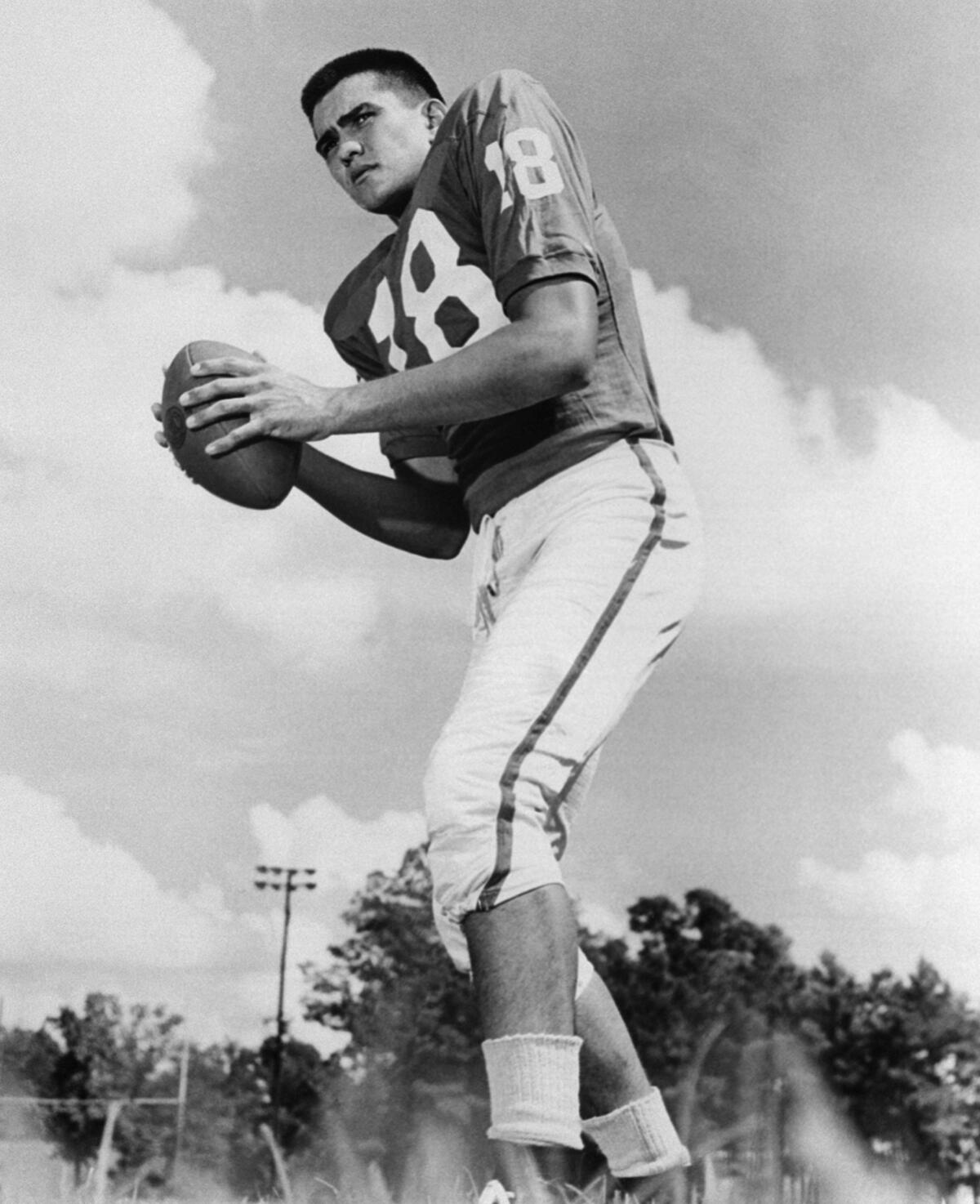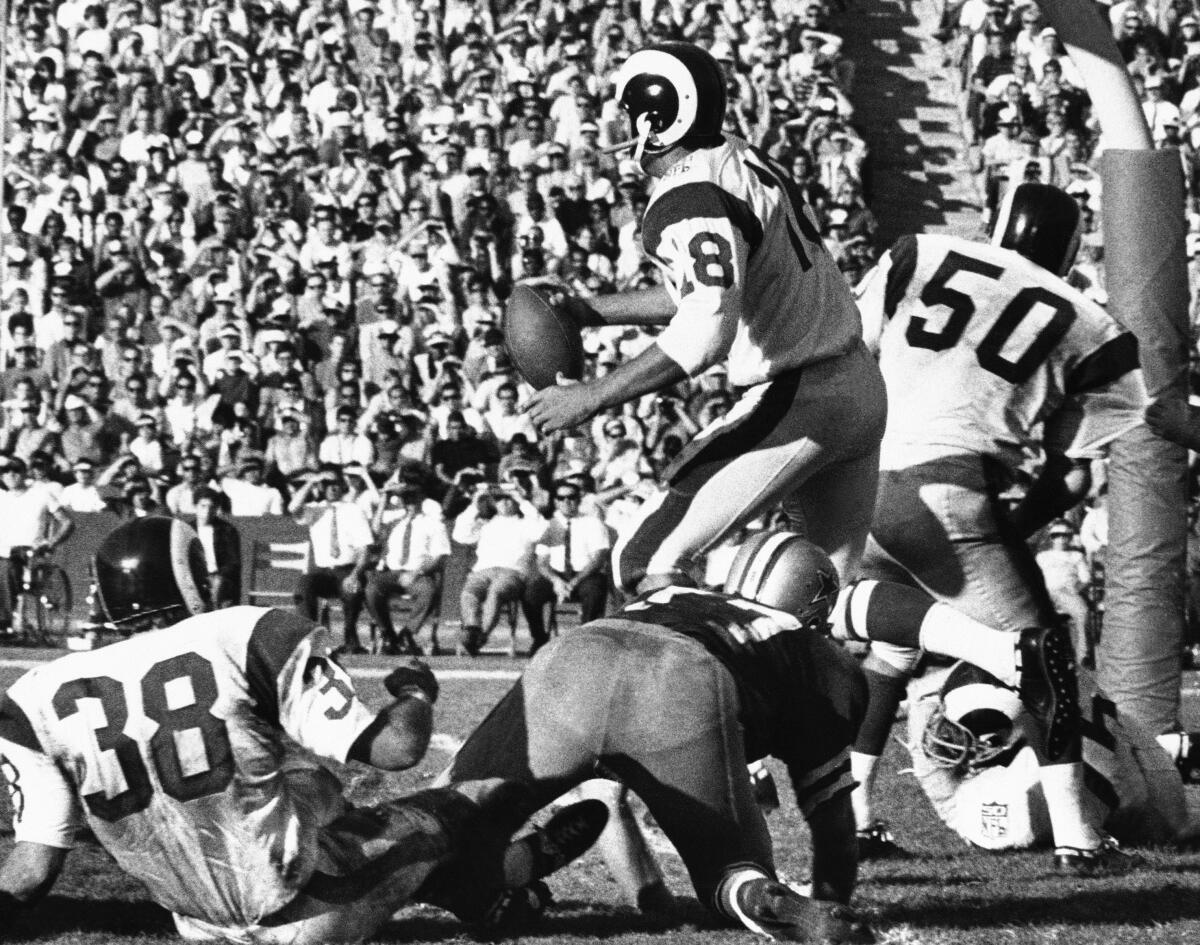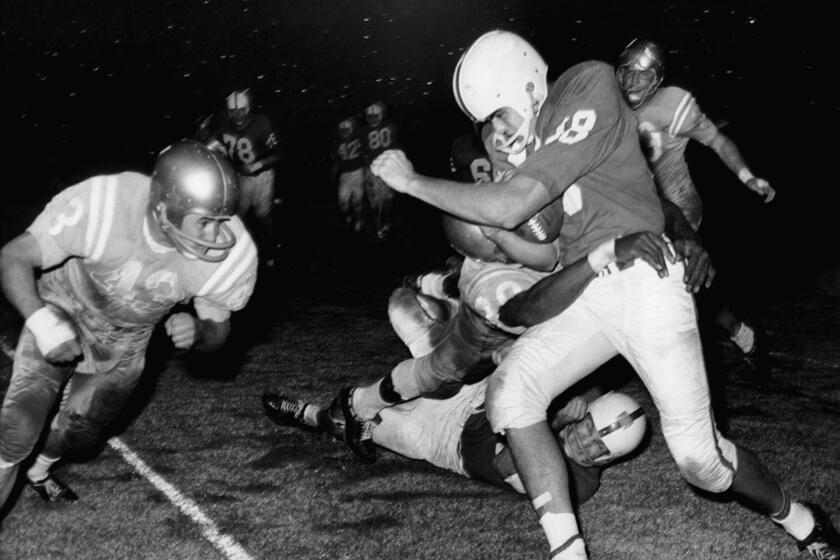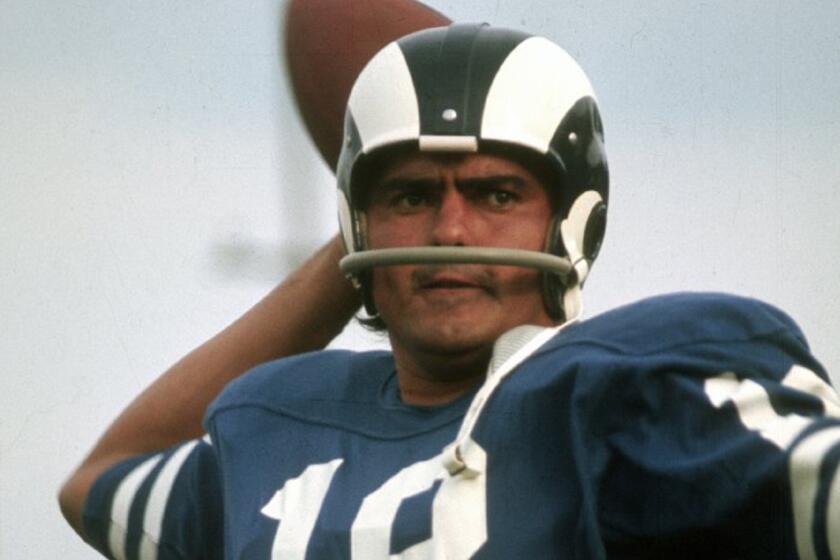Roman Gabriel, legendary Rams quarterback who shattered team records, dies at 83

- Share via
Considering that he was the No. 1 overall draft pick in one league and No. 2 in the other, the prize in a bidding war marked by intrigue and skullduggery, it took Roman Gabriel a long time to establish himself as a pro football quarterback.
Once he did, however, he went about cementing his place as one of the best of his day and a near-mythical figure in Rams’ lore. He stands tall in the company of such former Rams quarterbacks as Bob Waterfield and Norm Van Brocklin in Los Angeles and Kurt Warner in St. Louis.
And he did stand tall. Green Bay coaching legend Vince Lombardi once described him as “a big telephone pole.” At 6 feet 5 and 235 pounds, he was one of the first of pro football’s big quarterbacks. He also was the first Filipino American to play in the National Football League. Strong of arm — he could throw the football 70 yards — he staked his claim to fame by passing in an era when many coaches relied on a grind-it-out running game and saw the downfield pass as an option of last resort.
Forever royalty in the eyes of Rams fans, Gabriel died Saturday morning at age 83 of natural causes, his son Roman Gabriel III announced on X, formerly known as Twitter.
Roman Gabriel, who holds the Rams franchise record for TD passes, remembers the two times his North Carolina State Wolfpack came to L.A. to play UCLA.
Though it’s been nearly 50 years since he last played, Gabriel still holds the Rams’ records for touchdown passes, 154; passes thrown, 3,313, and victories by a starting quarterback, 74. He also ranks high among signal callers for the Philadelphia Eagles, with whom he spent the last five seasons of his NFL career, after 11 with the Rams.
“We mourn the loss of Rams legend and football pioneer, Roman Gabriel,” the Rams said on their X account. “We extend our condolences to his family and friends during this difficult time.”
Coming out of North Carolina State, where he had been a two-sport star and could well have lettered in a third, Gabriel was as hot a prospect as ever came down the pike. The Oakland Raiders of the fledgling American Football League, still trying to make a name for itself, had first choice in the AFL draft and chose Gabriel. The Rams, with the second pick in the far more established NFL, chose him, too.
The Rams were offering $15,000 a year and a $5,000 signing bonus; the Raiders $12,500 with a $2,500 bonus. When it appeared that Gabriel would sign with the Rams, the Raiders turned his AFL rights over to the Dallas Texans, then owned by oil billionaire and league co-founder Lamar Hunt.

Hunt, desperately wanting Gabriel for his league, was prepared to offer him $100,000, far more than any football player was making at the time. The Rams, though, with general manager Elroy “Crazylegs” Hirsch handling negotiations, had spirited Gabriel off to a hotel suite in Raleigh, N.C. Somehow, Hunt learned of the subterfuge and called Gabriel at the hotel to make the offer. Gabriel was in another room when the phone rang. Hirsch picked it up and — pretending to be Gabriel — turned Hunt down, saying he was going to play for the Rams.
Gabriel, knowing nothing of the fabulous offer and Hirsch’s chicanery, signed with Los Angeles. Only later did he learn of Hunt’s offer and by then, he had another reason to be concerned.
Waterfield was coaching the Rams then and according to Gabriel, he simply did not like the young quarterback, a two-time All-American, holder of every passing record at N.C. State and an academic All-American, as well.
“He said I was too dumb to play quarterback, that I couldn’t walk and chew gum at the same time,” Gabriel told the Sacramento Bee in 2007.
The way Roman Gabriel tells it, the same characteristics that made him a great football player -- bullheadedness, combativeness, stick-to-itiveness -- served him less favorably in his personal life.
Waterfield was gone after Gabriel’s rookie season but Harland Svare, Waterfield’s successor, gave the young quarterback only limited opportunities on the field over the next three seasons.
“They had Ron Miller, then they brought in Terry Baker, who had won the Heisman Trophy,” Gabriel told the Orange County Register. “Then there was Jerry Rhome, Karl Sweetan, Zeke Bratkowski, Bill Munson. Sometimes I practiced with the tight ends and wide receivers.”
Gabriel started only 23 games in his first four seasons, the Rams winning 11, losing 11 and tying once. He did, however, direct victories in 1965 over the eventual champion Green Bay Packers and the runner-up Cleveland Browns. In that same span, the other quarterbacks started 33 games, the Rams winning four, losing 27 and tying two.
That all changed when the Rams installed George Allen as coach in 1966. With the Rams’ “Fearsome Foursome” — defensive linemen Rosey Grier, Merlin Olsen, Lamar Lundy and Deacon Jones — growing dominant, Allen went with Gabriel at quarterback and Los Angeles, which hadn’t had a winning season since 1958, was suddenly a contender. The Rams finished at 8-6, then went 11-1-2 the next season, winning a division title but losing to the Packers in the playoffs.
Gabriel was honored as offensive player of the week the last two weeks of the 1967 regular season and the Rams finished as the highest scoring team in the league, with Gabriel throwing for 2,779 yards and 25 touchdowns.

Meanwhile, off the field, the battle between the two leagues had raged on, with the AFL trying to force a merger, and Gabriel again a focal point. So, when the Raiders came calling again in 1966, and Gabriel, making $22,500 a year and unsure of his status with the Rams, he signed with the AFL team for $400,000 and was issued a $100,000 check, which he folded and put in his wallet.
Most players in the days before mega-contracts had offseason jobs to supplement their incomes. Gabriel, Olsen and a few other teammates had a traveling basketball team that paid each $50 a game.
“I’d never had $100,000, so I put [the check] in my billfold and walked around with it for months,” he told the Santa Rosa Press Democrat.
When he learned of Allen’s ambitious plans for him, though, he signed again with the Rams and sent the uncashed check back to the Raiders. The Raiders responded by sending it back to Gabriel, who again returned it to the Raiders.
“You’d be surprised,” Gabriel recalled of the back-and-forth check exchange. “People still think I played for the Raiders.”
Later that year, the NFL agreed to merge with the AFL, ending the war between the leagues and ushering in the Super Bowl era. And, in Los Angeles, the Roman Gabriel era.
From 1967 to 1970, he led the Rams to a 41-14-4 record and two division titles, was twice an All-Pro and, in 1969, the league’s most valuable player and winner of the Bert Bell award as the Maxwell Football Club’s player of the year.
Allen, who had long been feuding with general manager Dan Reeves, left the Rams after the 1970 season to coach the team now known as the Washington Commanders, and Gabriel began losing playing time to knee and shoulder injuries. Suddenly, the Rams had lost their edge. When Chuck Knox came in as coach in 1973, he traded for San Diego Chargers quarterback John Hadl, sending Gabriel to the woeful Eagles.
In his first two seasons as starting quarterback, he brought the Eagles back to respectability and in 1973, was voted NFL comeback player of the year, leading the league in completions, yards passing and touchdowns.
He finished his NFL career with an 86-64-7 record, passing for more than 29,000 yards with 201 touchdowns.
The longest-tenured quarterback in Rams history is keeping a watchful eye on Thursday’s NFL draft.
It was always a bit of a mystery how Gabriel came by his athletic prowess. His father, also Roman Gabriel, was a Filipino who emigrated to Alaska, then made his way to Wilmington, N.C., where he became a waiter, then a cook for the Atlantic Coast Line railroad. His mother, Edna Mae Wyatt, was an Irish American with no athletic history. Gabriel had asthma as a child but was all-state, not only in football but basketball and baseball as well, at New Hanover High in Wilmington. The New York Yankees wanted to sign him out of high school but he opted for N.C. State, where he planned to play all three sports.
He did, indeed, play all three as a freshman and considered basketball his best sport but found that focusing on athletics was interfering with academics and, against famed Wolfpack coach Everett Case’s wishes, gave up basketball. He was a two-way player in football, a defensive back as well as quarterback, earning a spot in the College Football Hall of Fame, and enjoyed a successful college baseball career.
He found more football fame in Los Angeles but he also found Hollywood, or rather, it found him. He went to Vietnam to entertain troops with Bob Hope, had a major supporting role in “The Undefeated,” a 1969 movie starring John Wayne and Rock Hudson, and was a prison guard in Otto Preminger’s “Skidoo.” He also had roles on TV in “Gilligan’s Island,” “Ironside” and “Wonder Woman.”
After football, he was a TV commentator for two seasons and did some coaching. He was, in fact, the last coach at Cal Poly Pomona before the school dropped football. Later in life, he concentrated on charity work, his organization building the first Ronald McDonald House in North Carolina.
Kupper is a former Times staff writer
More to Read
Start your day right
Sign up for Essential California for the L.A. Times biggest news, features and recommendations in your inbox six days a week.
You may occasionally receive promotional content from the Los Angeles Times.









